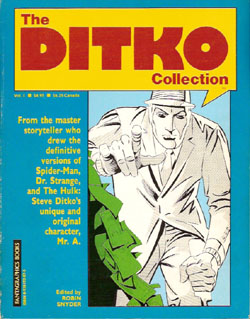
Edited by Robin K. Snyder (Fantagraphics Books)
ISBN: 0-930193-07-5
After Steve Ditko left Marvel he continued working for Charlton Comics before creating such cult classics as The Hawk and the Dove and the superbly captivating Beware… The Creeper at DC in 1968. It was during this period that the first strips derived from his interpretation of the Objectivist philosophy of novelist Ayn Rand began appearing in fanzines and independent press publications like Witzend and The Collector.
This softcover book from that champion of all that is good at the Fringes, the Experimental and the just plain Different, Fantagraphics Books, edited by fan and bibliographer Robin K. Snyder, represents lost treasures of a driven and dedicated artistic trailblazer whose beliefs never faltered, whose passion never waned and whose art never stagnated. Amongst beautiful tone and wash gag pieces, are the sometimes strident, occasionally didactic, but always bold, impassioned and above all – for Ditko never forgets that this is a medium of Narrative and Art – gripping stories and parables of some of his most honest – and infamous characters.
The challenging experience begins with the steel-masked Mr. A whose nine short dramas and various concept pages/pin-ups/spot illustrations make up the bulk of this book. In many respects A is an extension of that faceless Agent of Justice, The Question, looking at society, ruthlessly seeking Truth and utterly incapable of moral compromise.
Whilst working on Mr. A Ditko also examined the very concept of Heroism with the two-part ‘H Series’. “D. Skys†is a successful actor whose career stalls because he won’t accept the increasing tide of nihilistic, anti-heroic and morally bankrupt roles society seems to be demanding. Instead of taking the soft option of compliance, the disaffected player finds a more worthwhile use for his talents as a righter of wrongs using his talents to benefit society rather than collude with its downfall.
The volume concludes with the truly intense ‘J Series’; a harsh examination of the concept of justice and even some notions on how to attain and abide by it.
The most common complaint about this area of Ditko’s work – and there have been many – is the sometime hectoring nature of the dialectic. Nobody likes to be lectured to – but that’s how things are learned. Our schools and Universities depend on the lecture as their primary tool of communication, just as Ditko’s is the comic strip artform.
He’s showing you a truth he believes – but at no time is he holding a gun to your head. If you disagree that’s up to you. He acknowledges that you are equals and that you are ultimately responsible for yourself. It’s a viewpoint and tactic an awful lot of religions could benefit from.
I love comics. Steve Ditko has produced a disproportionate amount of my favourite pages over the decades. He is a unique voice and an honest genius with pencil and brush. The tales here have been collected elsewhere; never often enough, always with little fanfare. But if you can find this volume and its sequel you’ll see a lot of his best work, undiluted by colour, and on lovely large (274x212mm) white pages.
But even if you can’t find these, find something. Because Steve Ditko is pure comics.
© 1985 Steve Ditko. All Rights Reserved
